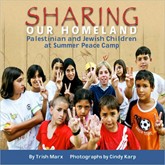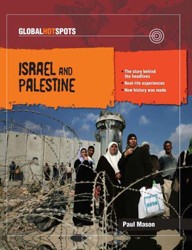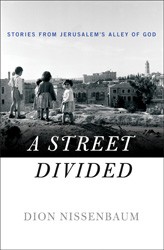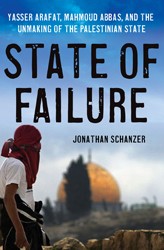Marketed as a chronicle of the friendship between Ruth Dayan, the first wife of Israel’s iconoclastic war hero Moshe Dayan, and Raymonda Tawil, a Palestinian leader in her own right who ended up becoming Arafat’s mother-in-law, An Improbable Friendship does not deliver. Given its highly personable introduction, involving Skype sessions with these two feisty older women — Ruth in Tel Aviv and Raymonda in Malta — the reader wonders how they became and remained friends. That question, however, is never answered.
Instead, the book is a dual biography. The reader is put on a high-speed train through the history of the Israeli-Palestinian conflict, looking mainly out the window of the Palestinian side. The early days when Jews and Arabs lived together in British Mandate Palestine is painted in idyllic colors; once Israeli independence is declared and won, Israel is portrayed as a mighty state oppressing its Arab inhabitants and never considered a fledgling state defending its right to exist against neighbors bent on its destruction.
The two protagonists do not meet in person until the middle of the book, and even after that they seldom appear together. Except for the introduction and a few missives, the reader is not provided any insight into this friendship. Proud, ferocious and enigmatic characters populate the book — the most colorful and most interesting of them is Raymonda’s mother Christmas, whose fateful choices would have warranted deeper examination and characterization. In fact, Christmas deserves a biography of her own.
A strictly personal lens is probably the only one that could shed new and refreshing light on this over-reported conflict. An Improbable Friendship could have been an intensely personal book about a remarkable friendship; instead it is a run-through of Peace Now and old-school PLO predictability.
Annette Gendler’s work has appeared in the Wall Street Journal, Tablet Magazine, Kveller, Bella Grace, and Artful Blogging, among others. She served as the 2014 – 2015 writer-in-residence at the Hemingway Birthplace Home in Oak Park, Illinois. Born in New Jersey, she grew up in Munich, Germany, and now lives in Chicago where she teaches memoir writing.
Discussion Questions
Courtesy of Anthony David
- Ruth’s desire as a young girl was to leave her middle-class home in Jerusalem and live on a socialist kibbutz. What does it say about her that she was willing to give up on city luxuries in order to “build the land”? Can you imagine a son or a daughter doing the same? How would you have reacted had you been her parents Rachel or Zvi?
- Why was Moshe, born on a kibbutz, called a “Jewish Bedouin”? Do you think he was in love with Ruth when they got married? Do you think he married her in part to escape from farm life?
- Discussed ways the aristocratic privilege enjoyed by Habib Hawa, Raymonda’s father, clashed with his wife’s sense of American independence and freedom. Do you relate to Christmas’s decision to divorce him, even though it was a taboo at the time?
- Israelis call the Arab-Israeli war of 1948 “War of Independence,” while for Palestinians it was the “Nakba,” or “Catastrophe.” Chapter 7 describes how Raymonda’s family lost their lands and homes because of the war, while in Chapter 8 Ruth followed Moshe around Haifa taking inventory of abandoned Arab property. Take the point of view of Raymonda during the siege of Haifa, and tell the group how you felt. Now, imagine being Ruth in Haifa, having buried friends and family and now witnessing an empty city. Like Ruth, would you have felt guilty for taking Arab property?
- In addition to being the patriarch of the Dayan family, in the 1950s Chief of Staff Dayan was responsible for the security of the State of Israel. How did his power and responsibility influence his role as patriarch? Was Moshe’s philandering excusable given the pressures of his job? Do you think Moshe was egotistical? Should people with power be judged by different standards than others?
- Ruth sacrificed much to support Moshe. Should she have left him earlier because of his affairs? Was she a victim of her love for him? How do you support someone if it means sacrificing so much of yourself? How would you feel if you were the spouse of an unfaithful partner with great power and responsibility?
- On page 49 Raymonda visits Dvora, her best friend whose family was living in the house that once belonged to Raymonda’s aunt. How would you have felt if you were Raymonda, walking to her aunt’s former house and pressing the bell? How would you have reacted to Dvora’s mother, a survivor of the Holocaust? How did Raymonda’s ability to empathize with Dvora influence her attitudes about Israel?
- Describe Raymonda’s complex identity at the age of 17 just before she left Israel for Jordan. Now consider Raymonda two years later in Jordan. How did her childhood relationship with Jewish friends impact her adult life in a conservative Arab country?
- When asked why she divorced Moshe, Ruth said she was able to travel to Gaza any time she pleased. In your opinion, why did she choose to end the marriage when she did? How did meeting Raymonda impact her decision? When reading Chapter 32, were you rooting for Ruth or Raymonda? Or for both?
- What qualities did Raymonda possess that endeared her to Ruth? Were these qualities initially absent in Ruth and, if so, how did she grow as a result of their friendship?
- Though reaching out to Israelis was dangerous for Raymonda, she never hesitated. How did the mission she received from Father Michel in Chapter 15 influence this?
- As an activist Raymonda refused to condemn the PLO’s use of violence. Do you see a moral parallel in Ruth’s refusal to criticize openly the Israeli military? What are the differences?
- Throughout the 1970s and 80s, Raymonda’s husband Daoud tried to rein her in because of the dangers her activism posed to the family. Take the point of view of Daoud. How would you try to prevent a loved one from potentially perilous activism? How do you balance prudence and family responsibility with the desire for justice?
- Raymonda speaks throughout the book of a “return” to Haifa. She advocates a single democratic state. Why do you think that is? Is it because of her admiration for Israeli feminists? What would you say to a Palestinian wanting citizenship and equal rights in a single state with Israeli Jews?
- The book follows the stories of two women’s lives through the history of the modern Middle East. As a reader what have you gained by seeing the Israeli- Palestinian conflict through the viewpoints of these two women? What do their perspectives bring to the history of the Israeli-Palestinian conflict? Are you now more or less hopeful in a resolution to the conflict?





